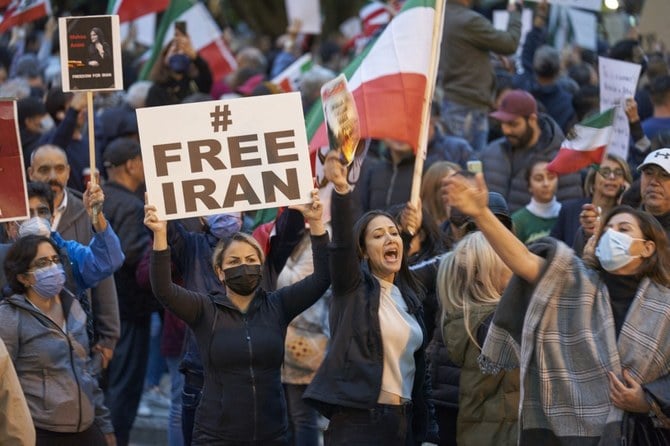
Since its establishment in 1979, the Islamic Republic has dealt with the US administrations of Jimmy Carter, Ronald Reagan, George H.W. Bush, Bill Clinton, George W. Bush, Barack Obama and now Donald Trump. The pressure the regime has been facing during the Trump administration is unprecedented.
Iran’s oil exports have been significantly cut; the people’s dissatisfaction with the regime has culminated in two nationwide protest movements in the last three years; inflation and unemployment are at record highs; the coronavirus disease pandemic has further worsened the overall political and economic situation; and divisions within the theocratic establishment are wider than ever before.
But one of the skills that the regime has mastered over the four decades of its rule is to exercise patience. From the perspective of the Iranian leaders, they have survived the Trump administration and are now eagerly awaiting November’s US presidential election and a potential Joe Biden victory.
Since the mullahs believe that the Trump administration has been seeking regime change despite the White House’s denials, they feel that Trump has failed in his policy on Iran. Foreign Minister Mohammed Javad Zarif last month argued that Trump has concluded that his “maximum pressure” policy has failed. Zarif said: “I don’t think Trump believes anymore in talk that the Islamic Republic is about to collapse. But he keeps repeating his mistakes. It seems that they (US officials) know they have committed errors but don’t know how to correct them.”
Iran’s state-owned newspapers and politicians are very optimistic about Biden defeating Trump. Last week, a Mardom Salari newspaper headline read, “Biden getting more popular at time of Trump’s decline.” Meanwhile, an NBC News/Wall Street Journal poll this month showed that the former vice president holds an 11-point lead over Trump, 51 percent compared to 40.
Amid all the bad news that the Iranian leaders have received and among all the difficulties the regime has encountered since Trump was elected, the theocratic establishment looks at Biden as a way out of its crippling crisis. To begin with, a Biden administration would most likely return to the Iran nuclear deal, which Trump decisively pulled out of in 2018. Returning to the Joint Comprehensive Plan of Action would effectively include endorsing all of the reported secret agreements that were struck by the Obama administration, which Biden served as vice president.
This move would likely ensure that all sanctions would again be lifted and billions of dollars would flow into Iran’s treasury. Once again, the regime would be capable of deploying the extra revenue to fan the embers of unrest in the Middle East. This would include funneling some of the money into the Islamic Revolutionary Guard Corps to expand the regime’s influence and military stranglehold across the Middle East, including in Syria, Iraq, Lebanon and Yemen.
This would be good news for Syrian President Bashar Assad, who is also under significant economic pressure. The nuclear deal previously saved Assad when he was on the verge of losing his grip on power. He received a boost as Iran ramped up its “investment” in Syria by spending between $6 and $35 billion a year to keep its staunchest regional ally in power.
In addition, Iran would also be able to strengthen its Shiite armies and proxies, such as Hezbollah in Lebanon, the Houthis in Yemen, and the conglomerate of about 40 Iraqi Shiite militias under the banner of the Popular Mobilization Forces. It is not hard to track Iran’s aggression and quest for regional dominance in the Middle East.
Without Iran’s cash, many militias and terror groups would not be able to survive. As Hezbollah’s leader, Hassan Nasrallah, has admitted: “We are open about the fact that Hezbollah’s budget, its income, its expenses, everything it eats and drinks, its weapons and rockets, are from the Islamic Republic of Iran. As long as Iran has money, we will have money.” He added: “Just as we receive the rockets that we use to threaten Israel, we are receiving our money. No law will prevent us from receiving it.”
Through the prism of the ruling clerics, a Biden presidency, a return to the nuclear deal and a renewed flow of money would enable them to more powerfully and forcefully suppress domestic opposition and pay their radical loyalists to advance the regime’s revolutionary ideals and ensure the hold on power of Supreme Leader Ali Khamenei.
It should, therefore, not come as a surprise that the Iranian regime sees it as good news and a way out of its crisis if Biden is elected president. Unfortunately, what should come as a surprise is that the Democratic Party does not seem to be considering the damage the nuclear deal and the Obama administration’s appeasement of the Iranian regime inflicted on Iranian citizens, the region and even people as far away as Latin America.
Dr. Majid Rafizadeh is a Harvard-educated Iranian-American political scientist. Twitter: @Dr_Rafizadeh
Disclaimer: Views expressed by writers in this section are their own and do not necessarily reflect Arab News" point-of-view












